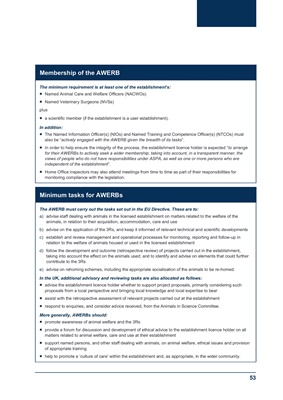
53
Membership of the AWERB
The minimum requirement is at least one of the establishment's:
Named Animal Care and Welfare Officers (NACWOs)
Named Veterinary Surgeons (NVSs)
plus
a scientific member (if the establishment is a user establishment).
In addition:
The Named Information Officer(s) (NIOs) and Named Training and Competence Officer(s) (NTCOs) must
also be "actively engaged with the AWERB given the breadth of its tasks".
In order to help ensure the integrity of the process, the establishment licence holder is expected "to arrange
for their AWERBs to actively seek a wider membership, taking into account, in a transparent manner, the
views of people who do not have responsibilities under ASPA, as well as one or more persons who are
independent of the establishment".
Home Office inspectors may also attend meetings from time to time as part of their responsibilities for
monitoring compliance with the legislation.
Minimum tasks for AWERBs
The AWERB must carry out the tasks set out in the EU Directive. These are to:
a) advise staff dealing with animals in the licensed establishment on matters related to the welfare of the
animals, in relation to their acquisition, accommodation, care and use
b) advise on the application of the 3Rs, and keep it informed of relevant technical and scientific developments
c) establish and review management and operational processes for monitoring, reporting and follow-up in
relation to the welfare of animals housed or used in the licensed establishment
d) follow the development and outcome (retrospective review) of projects carried out in the establishment,
taking into account the effect on the animals used; and to identify and advise on elements that could further
contribute to the 3Rs
e) advise on rehoming schemes, including the appropriate socialisation of the animals to be re-homed.
In the UK, additional advisory and reviewing tasks are also allocated as follows:
advise the establishment licence holder whether to support project proposals, primarily considering such
proposals from a local perspective and bringing local knowledge and local expertise to bear
assist with the retrospective assessment of relevant projects carried out at the establishment
respond to enquiries, and consider advice received, from the Animals in Science Committee.
More generally, AWERBs should:
promote awareness of animal welfare and the 3Rs
provide a forum for discussion and development of ethical advice to the establishment licence holder on all
matters related to animal welfare, care and use at their establishment
support named persons, and other staff dealing with animals, on animal welfare, ethical issues and provision
of appropriate training
help to promote a "culture of care" within the establishment and, as appropriate, in the wider community.